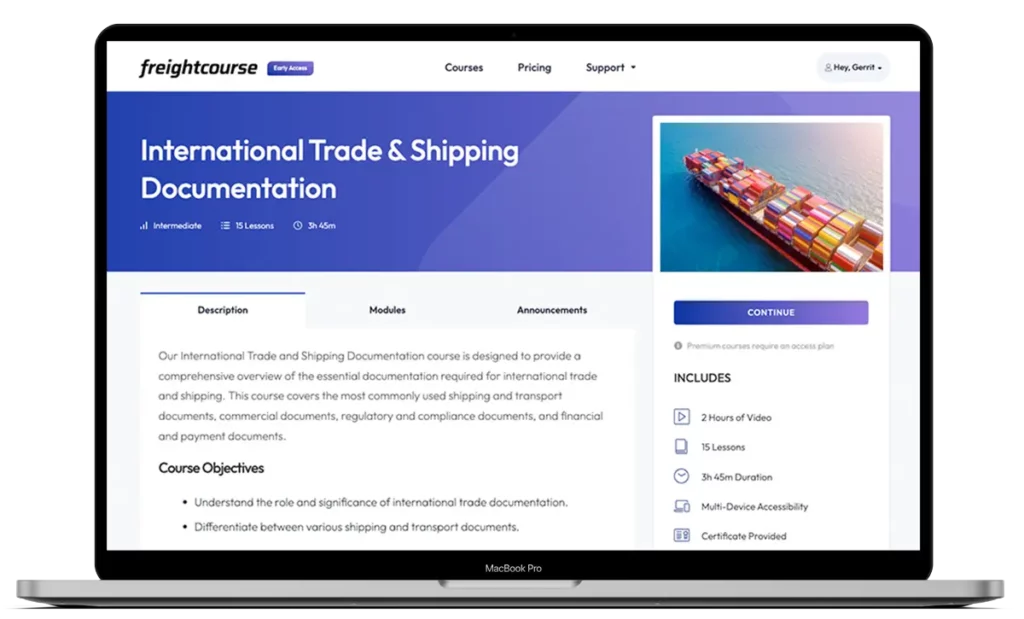The transportation industry is among the broadest industries in the market, encompassing a diverse pool of human resources working at different touchpoints in the supply chain process.
As most shippers, consignees, and general audiences are familiar with logistics professionals operating in the front end of operations, freight brokers and truck dispatchers are among the two most popular professions.
Many use the terms ‘broker’ and ‘dispatcher’ interchangeably since both are third-party service providers performing several similar tasks. However, the majority of their scope and responsibilities are relatively different.
In essence, a freight broker is an agent who serves as an intermediary between carriers and shippers. Their key role is to connect both parties and facilitate, simplify, and accelerate the overall process for a small commission. A broker’s commission is usually the difference between what they demand from shippers and what they pay to carriers and other service providers.
On the other hand, a dispatcher is a carrier representative responsible for carrying out freight negotiations and certain parts of the operations. Their key role is to find and coordinate high-paying freight for trucking companies and owner-operators by maximizing truck utilization. For their services, dispatchers take a percentage of the negotiated rate instead of a commission.
In this article, we’ll provide an in-depth comparison between freight brokers and dispatchers, and explain their key similarities and differences in salary, job scope, and skillsets. We’ll also share a simple guide to choosing between a freight broker or dispatcher for your business.
Salary Comparison
One of the main differences between a freight broker and a dispatcher is the money they make. The salary range is notably wide and closely comparable between both roles with freight brokers having a slightly higher potential depending on the scope they cover.
Variances in remuneration may be due to several factors, including experience, skillsets, level of operations, seniority, and value-added services, as well as training and certifications, to name a few.
However, in most cases, the salary range for both third-party service providers depends heavily on the performance of their brokerage firm or dispatcher company since these entities earn a percentage of the revenue generated from moving cargo.
Below is a typical salary range of employees working as freight brokers or dispatchers for a company:
- Freight Broker: $38,000 to $96,000 a year with 401(k) benefits
- Dispatcher: $42,000 to $62,000 a year
Skill Set Comparison
While freight brokers and truck dispatchers take a different approach to facilitating supply chain continuity, the skill sets required to do so are mostly similar. The section below covers in detail the skill sets that apply to both scopes of work and what skills are a better fit for either freight brokers or dispatchers:
Similarities
To start, we’ll share some of the primary skillsets shared between freight brokers and dispatchers.
- Computer Literacy – Freight brokers and dispatchers must be computer-literate and tech-savvy. A considerable aspect of their role involves using load boards, transportation management systems (TMS), digital freight matching tools (DFM), and several other supply-chain-related solutions.
- Languages – Both freight brokers and dispatchers are required to be familiar with the popular jargon in the freight industry. They may also need to converse in different languages, which is crucial when managing negotiations with international clients, drivers, and other interested parties.
- Organizing – One of the most important skills brokers and dispatchers share is organization. This fundamental skill allows them to handle multiple orders and shipments, negotiate with different clients and service providers, and manage several other aspects of a typical freight service routine.
- Emotional Intelligence – Like any other service professional, brokers, and dispatchers should possess high emotional quotient (EQ) skills and have excellent emotional control. Freight service environments can be incredibly stressful and hectic. Therefore, managing your emotions well and the emotions of clients, coworkers, and other stakeholders is highly beneficial for both roles.
- Critical Thinking – In many cases, freight brokers and dispatchers must think on their feet and deal with unexpected events and situations, such as last-minute order changes, equipment breakdowns, cargo damage, accidents, injuries, and more. Therefore, outside-the-box and critical thinking are essential skills both professionals should possess and use to solve different problems during a typical service routine.
- Negotiation – Freight brokers and dispatchers make money by negotiating the best rates for the parties they represent. As a result, seasoned professionals usually have excellent negotiation skills using which they can present a good, mutually-beneficial compromise for all parties involved.
- Networking – Like most third-party service providers, freight brokers, and dispatchers leverage excellent networking skills. They use them to build connections with shippers, carriers, owner-operators, and other stakeholders to provide the best service possible.
Differences
As mentioned earlier, although freight brokers and dispatchers have overlapping skills, there are certain skills that are applied differently or are exclusive to each role. Below are the key differences between both professionals in terms of skillsets or the utilization of different skills.
- Communication – Truck dispatchers need to effectively engage in vertical communication with clients and carriers, all the way to the truck drivers. This requires various communication techniques to maintain a seamless operation. In contrast, freight brokers usually communicate externally with only the key personnel of shippers and carriers through load boards or other touchpoints.
- Planning – Freight brokers plan and schedule larger shipments in bulk covering various modes of transportation (i.e. ocean, air, road, and rail). Meanwhile, truck dispatchers usually plan smaller shipments in higher and/or more frequent quantities. Therefore, service providers have unique planning, organizing, and controlling processes. For instance, freight brokers use their planning skills to simplify and accelerate the customs clearance process for larger shipments. Similarly, dispatchers use their skills to streamline and manage delivery processes at higher frequencies using efficient routes.
- Time Management – Time management is another skill brokers and dispatchers need to be proficient in but is applied differently in their respective industries. For instance, dispatchers work in fast-paced environments and use their time management skills to fit as many loads as possible into their routine by using load boards to find clients that best fit into their represented carrier’s scheduling. Conversely, freight brokers use their time management skills to speed up communications (negotiations) and align processes between shippers, truckers, customs officers, and other stakeholders to improve productivity, profit, and operational efficiency.
- Risk Management – Similarly, risk management applies to both professionals, but in different ways due to the nature of the risks involved. For instance, freight brokers risk disrupting their schedules if they miss a vessel’s timing. On the other hand, dispatchers may face a completely different risk such as a shortage of trucks due to breakdowns or absent drivers causing them to incur additional penalties from their clients.
- Multi-Industry Knowledge – Perhaps, the biggest skill-based difference between freight brokers and dispatchers is multi-industry knowledge. Shippers come from various industries, including manufacturing, automotive, aerospace, agriculture, construction, and more. Since a broker’s scope involves customs clearance and matching cargo types to the right carriers, they need to be well-versed in multiple industries or sectors to better understand their potential client’s supply chain processes and specific transport needs.
Job Scope Comparison
Due to the nature of their functions, freight brokers and truck dispatchers have different job scopes. Freight brokers are mainly responsible for facilitating cargo movement.
In some cases, they also represent shippers or consignees and offer several other value-added services, including bookkeeping. Conversely, dispatchers are responsible for pick-up and drop-off coordination, fleet management, and supervision. The table below provides a detailed list of the job scope of each service provider:
| Freight Broker | Freight Dispatcher | |
| Core Activities | Facilitating freight movement and documentation. Acts as an intermediary in some cases representing their client (shipper/consignee) | Coordinating pick up and drop offs, and managing drivers and fleet. This task also includes effective route planning and similar activities. |
| Modes of Transport | Trucking, Airfreight, Sea Freight, Rail Freight | Trucking |
| Representation | Represents the shipper, consignee, or themselves | Represents themselves or a carrier |
| Regulations | Requires freight broker registration, freight brokerage bond, and adherence to regulations from FMCSA | Not regulated and doesn’t require a bond. |
| Customers | Shippers and consignees | Carriers, shippers & brokers |
| Liaison | Shippers, consignees to organize shipments, and carriers & other service providers as subcontractors | Carriers (trucking companies) and drivers. Occasional communication with shippers and consignees to coordinate pick up & drop-offs. |
| Documentation | Carriage of Contracts (Truck BL, OBL, SWB, AWB). Customs Clearance (if applicable) | Invoicing (for factoring companies) and dispatch-related documents |
| Due Diligence | Vetting of subcontractors (carriers, agents, other service providers). Vetting of shippers & consignees’ creditworthiness | Vetting of shippers of creditworthiness when securing loads |
| Systems & Tools | Transport Management Systems, Port Systems, Customs Systems, Load Boards | Transport Management Systems, Fleet Management Systems, Load Boards |
| Value-Added Services | Shipment tracking and tracking, optimizing shipping routes and methods, freight invoice auditing, freight invoice payment, customs clearance, customer service | Customer service (external) to shippers and carriers. Customer service (internal) to drivers. |
| Reporting | Shipment reporting, customer invoicing, claims management | Mileage, utilization, and idling reports. Shipment scheduling reports. |
How Do Companies Choose Between a Freight Broker and Dispatcher?
Both freight brokers and dispatchers have distinct functions that fulfill different requirements. In this section, we will discuss circumstances that each role would best fit.
When to Choose a Freight Broker
You should choose a freight broker if you’re looking for an intermediary to handle every aspect of moving cargo from one location to another, from finding the right carrier to preparing documentation and dealing with all the supply chain entities in the processes.
A freight broker is also ideal if you’re looking for a one-stop solution for freight management and additional services, such as customs clearance, shipment tracking, accounting, and similar activities.
When to Choose a Truck Dispatcher
A truck dispatcher is more suited for managing a truck fleet and drivers, planning routes, organizing shipping documentation, and analyzing business data. They’re also ideal for shippers looking to connect with carriers instead of outsourcing the entire process to brokers.
Can You Be Both a Freight Broker and Dispatcher?
It’s possible to become a freight broker and dispatcher at the same time if you possess the required skills. Although some of their roles overlap and are often non-mutually exclusive, most of their job scopes are inherently different.
Freight brokers generally serve as intermediaries between shippers and carriers. Hence, they’re focused on moving freight from one location to another. Meanwhile, truck dispatchers are more involved with driver coordination and fleet management.
Furthermore, dispatchers looking to become freight brokers must register with the FMCSA for regulation compliance and require a freight brokerage bond.
Freight Broker and Dispatcher Training Courses
Below are some highly recommended courses you can take to start a freight brokerage or dispatcher business. You can also use these courses to secure a job in the industry to gain relevant experience beforehand:
Freight Broker Training:
Dispatcher Training:
| Training Company | Course Name | Website |
| NDFCA | National Freight Dispatcher Certification | Link |
| LearnDispatch | Truck Dispatcher Training Course | Link |
| Udemy | Truck Dispatch Training | Link |
| Truck Dispatcher Training | Truck Dispatcher Training Course | Link |
| Alison | Freight Dispatcher | Link |

Get Free Course Access
If you enjoyed the article, don’t miss out on our free supply chain courses that help you stay ahead in your industry.

Andrew Lin
Co-Founder & Writer
at freightcourse
About the Author
Andrew is a multi-business owner with over 12 years of experience in the fields of logistics, trucking, manufacturing, operations, training, and education.
Being the co-founder of freightcourse has given him the ability to pursue his desire to educate others on manufacturing and supply chain topics.
Follow us